A triumvirate or a triarchy is a political institution ruled or dominated by three individuals, known as triumvirs. The arrangement can be formal or informal. Though the three leaders in a triumvirate are notionally equal, the actual distribution of power may vary. The term can also be used to describe a state with three different military leaders who all claim to be the sole leader.
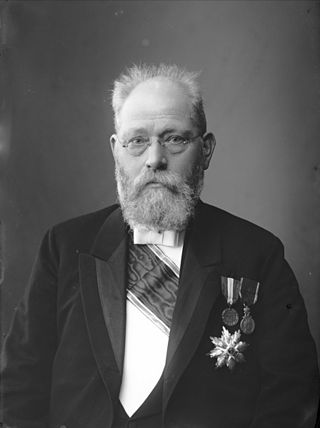
Abraham Theodor Berge was the 15th prime minister of Norway from 1923 to 1924. He was a teacher and civil servant who represented the Liberal Party, the social liberal party, and later Free-minded Liberal Party, a right-of-centre party.

Otto Bahr Halvorsen was a Norwegian lawyer and politician from the Conservative Party, who served as the 14th prime minister of Norway from 1920 to 1921 and again in 1923 up until his death in office.

The Minister of Foreign Affairs is a councilor of state and chief of the Norway's Ministry of Foreign Affairs. Since 16 October 2023, the position has been held by Espen Barth Eide of the Labour Party.

Asbjørn Halvorsen, nicknamed Assi, was a Norwegian footballer, who played as a centre-half for Sarpsborg FK and Hamburger SV. He was capped 19 times playing for Norway, and was a part of the Norwegian team who competed in the 1920 Summer Olympics. He was later Secretary general of the Norwegian Football Association, and acted as head coach of the Norwegian national team. He is regarded as the architect behind the Norwegian "Bronze Team" that finished third in the 1936 Olympics.
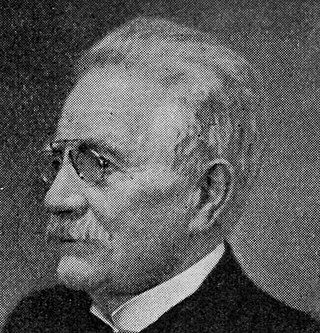
Edvard Hagerup Bull was a Norwegian jurist and assessor of the Supreme Court of Norway. He was a member of the Norwegian Parliament and government official with the Conservative Party of Norway.
Johan Henrik Rye Holmboe was a Norwegian businessperson and politician for the Free-minded Liberal Party. He was a city council member in Tromsø for 42 years, a three-term member of Parliament, Minister of Provisioning from 1920 to 1921, and Minister of Trade from 1923 to 1924.
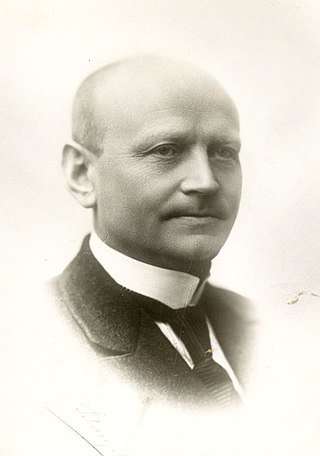
Anders Venger was a Norwegian politician of the Conservative Party. He served Minister of Agriculture from 1923 to 1924, Minister of Labour from March to July 1926 and acting Minister of Education and Church Affairs from November to December 1923 following the death of Ivar Bergersen Sælen. He also served as deputy leader of the Conservative Party from 1920 to 1925.

Stoltenberg's Second Cabinet was the Government of Norway from 17 October 2005 to 16 October 2013. It was a coalition between the Labour Party, the Socialist Left Party and the Centre Party, known as the Red–Green Coalition. On 9 September 2013, the coalition was defeated in the 2013 election.

The Estonian government-in-exile was the formally declared governmental authority of the Republic of Estonia in exile, existing from 1944 until the reestablishment of Estonian sovereignty over Estonian territory in 1991. It traced its legitimacy through constitutional succession to the last Estonian government in power prior to the June 1940 Soviet invasion and occupation of the country. During its existence, it was the internationally recognized government of Estonia.
Events in the year 1872 in Norway.
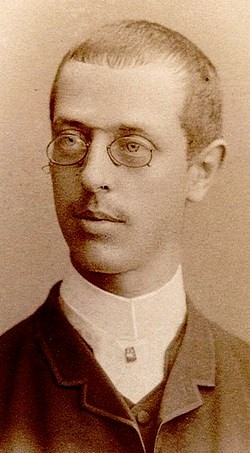
Christian Fredrik Michelet was a Norwegian lawyer and politician for the Conservative Party.

Bahr Halvorsen's First Cabinet governed Norway between 21 June 1920 and 22 June 1921. The Conservative and Free-minded Liberal Party cabinet was led by Otto Bahr Halvorsen. It had the following composition:
In Norway, a state secretary is a partisan political position within the executive branch of government. Contrary to the position secretary of state in many other countries, a Norwegian state secretary does not head the ministry, rather, they are second in rank to a minister. Resembling a de facto vice minister, the state secretary, however, cannot attend a Council of State, and does not act as a temporary minister in case of illness or other leave of absence.
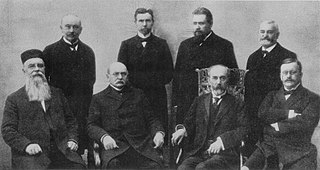
Knudsen's First Cabinet governed Norway between 19 March 1908 and 2 February 1910. It had the following composition:

The Michelsen's Cabinet was a Norwegian cabinet, formed by a coalition of the Liberal Party, the Conservative Party, the Moderate Liberal Party and the Coalition Party. It governed Norway between 11 March 1905 and 23 October 1907. It entered office as part of the build-up for the dissolution of the union between Norway and Sweden in 1905. It had the following composition:

Berge's Cabinet was the government of Norway from 30 May 1923 to 25 July 1924. The cabinet was led by Prime Minister Abraham Berge. It succeeded Otto Bahr Halvorsen's second cabinet following his death, and was composed of mostly the same ministers as its predecessor. The cabinet resigned on 23 July 1924, with effect two days later, after not getting wide support in the Storting for a alcohol ban. It was succeeded by Johan L. Mowinckel's first cabinet.

Knudsen's Second Cabinet was the government of Norway from 31 January 1913 to 21 June 1920, led by prime minister Gunnar Knudsen. It was a Liberal Party minority government. It was formed following Jens Bratlie's defeat in the 1912 election.












